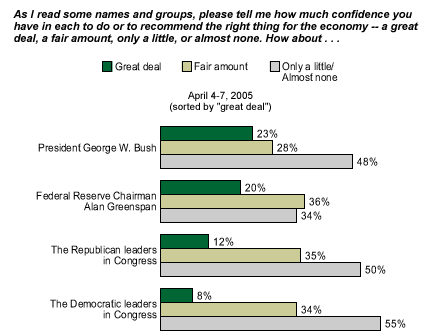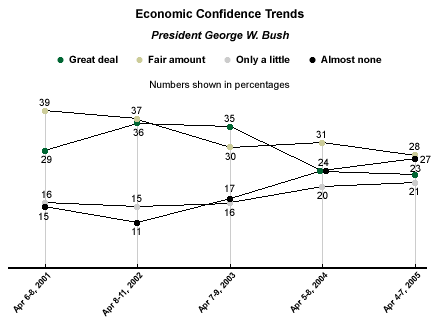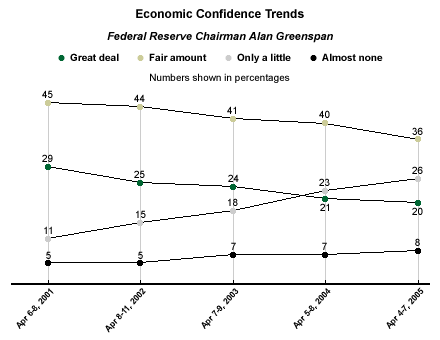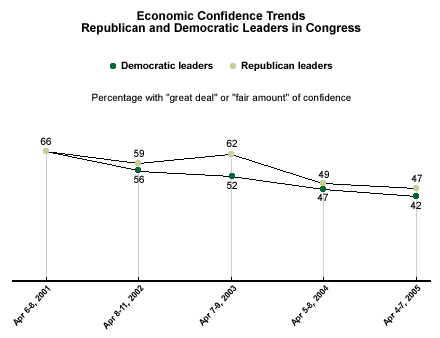High oil prices, stock market fluctuations, and sluggish growth are giving consumers plenty of reasons to worry about the economy, and those worries are taking a toll on their opinions of various economic policy setters. A recent Gallup Poll* finds Americans expressing the least amount of confidence since 2001 in the economic leadership of President George W. Bush and Federal Reserve Chairman Alan Greenspan. Confidence in the economic leadership of Republicans and Democrats in Congress is diminished as well.
The April 4-7 poll shows that slightly more than half of Americans have a "great deal" or "fair amount" of confidence in Bush and Greenspan to do or recommend the right thing for the economy. As has typically been the case, Americans express less confidence in the partisan leaders in Congress -- with 47% confident in the Republican leadership on the economy and 42% confident in the Democrats.

Downward Trends for Bush and Greenspan
The percentage of Americans expressing at least a fair amount of confidence in Bush's economic leadership is the lowest in several years. The high point for public confidence in Bush's economic leadership came in 2002, when nearly three-fourths (73%) of Americans had a great deal or fair amount of confidence in his economic ability, Since then, confidence dropped to 65% in 2003, 55% in 2004, and again to the current 51%.

While Greenspan's ratings are not as negative as Bush's, the pattern in confidence is similar. The percentage of Americans with a great deal or fair amount of confidence in Greenspan has never been lower. There has been a significant negative shift since 2001, with confidence falling from 74% then to 56% now.

Congressional Economic Leadership Not Viewed With Confidence
A downward trend is evident among Republicans and Democrats as well. Compared with their high marks in 2001, confidence has dropped 19 points for Republicans (from 66% to 47%) and 24 points for Democrats (from 66% to 42%).

Politics Plays a Role
The vast majority of Republicans (84%) say they have at least a fair amount of confidence in Bush's ability to recommend the right thing for the economy, compared with just 44% of political independents and 22% of Democrats. Along those same lines, Republicans (76%) are much more likely than Democrats (21%) to express confidence in the Republican congressional leaders. And, though not as strongly, Democrats (60%) are more likely than Republicans (31%) to have confidence in the Democratic congressional leadership's ability to handle the economy.
Though Greenspan has served under Republican and Democratic presidents, confidence in him is more robust among Republicans. Sixty-nine percent of Republicans say they have a great deal or fair amount of confidence in Greenspan, compared with 53% of independents and just 46% of Democrats.
*These results are based on telephone interviews with a randomly selected national sample of 1,010 adults, aged 18 and older, conducted April 4-7, 2005. For results based on this sample, one can say with 95% confidence that the maximum error attributable to sampling and other random effects is ±3 percentage points. In addition to sampling error, question wording and practical difficulties in conducting surveys can introduce error or bias into the findings of public opinion polls.
